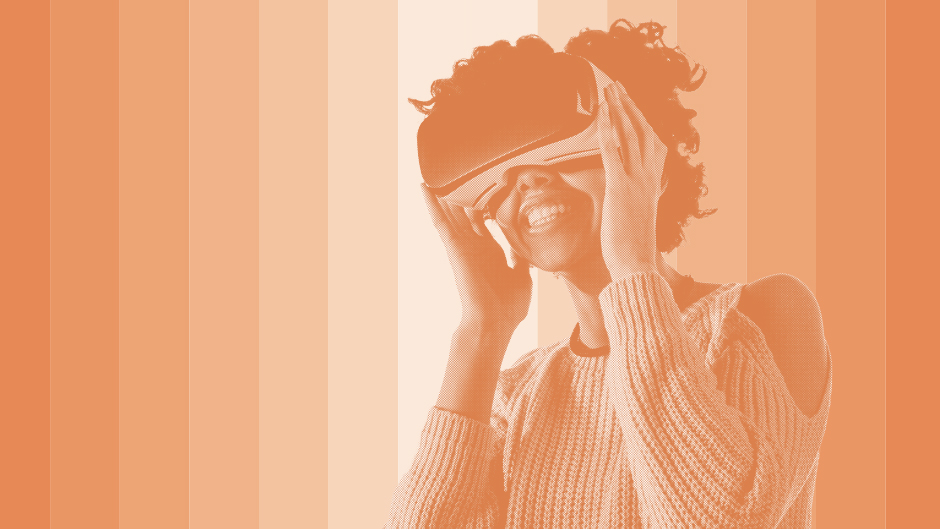Care to attend a symphonic art exhibit? Or to visit a health care facility to witness innovative cancer therapies?
Both are possible today with the convenience of virtual reality headsets.
And storytellers around the world are embracing the technology to create and share content in a whole new way.
To showcase these and many other visually stimulating projects, Miami-based FilmGate is holding its 10th annual immersive media festival, “Regenerate X,” on the University of Miami’s Coral Gables Campus this Thursday, Nov. 30, through Saturday, Dec. 2, at Lakeside Village.
By partnering with the University and its Frost Institute for Data Science and Computing (IDSC), FilmGate organizers hope to draw an international audience of researchers, filmmakers, educators, and industry leaders working to create and improve the latest applications of extended reality (XR), an umbrella term for virtual reality (VR), augmented reality (AR), and mixed reality. Participation in the festival’s three days of panels and exhibits on campus is free for University of Miami students and faculty and staff members.
“We want to make audiences feel as if they are in the entirely new digital world, or in a world augmented by almost magical layers,” said Diliana Alexander, executive director and co-founder of FilmGate. “We are leaping into a universe first imagined by science fiction writers, and everyone—from Apple and Microsoft to independent creators—is exploring what that means. We are bringing it to Miami for everyone to experience, firsthand.”
The festival will highlight more than 30 new interactive media projects, including 10 XR experiences created by faculty members at the University. In addition, at least 12 University faculty members from a range of disciplines will participate in panels to talk about some of the immersive reality experiences they have used or created to advance their research or enrich their classes.
“We are trying to drive the utilization of immersive technology across all of the schools and colleges at the University,” said Tom Merrick, senior project manager of XR initiatives at the University and interactive media lecturer at the School of Communication. “So with this festival, we are providing all of our schools and colleges the opportunity to showcase the things they have been doing, but we are also educating faculty about what’s happening with these XR technologies.”
In addition to Merrick, other faculty members from the School of Communication joining the festival includeChing-Hua Chuan, Lindsay Grace, Lorena Lopez, Rafal Sokolowski, Sanjeev Chatterjee, and Kim Grinfeder. From the College of Arts and Sciences, the conference will include art historian Karen Mathews and psychology assistant professor Yanerys Leon. Greta Mitzova-Vladinov from the School of Nursing and Health Studies will join one panel, and Frost School music engineer Tom Collins will also be participating, along with Dr. Giselle Ricur, ophthalmologist and executive director of virtual care at Bascom Palmer Eye Institute, which is part of the Miller School of Medicine.
Panels will explore topics such as how virtual reality transforms museum experiences; the role of mixed reality in enhancing research outcomes and fostering equity; the educational benefits of immersive games in simplifying complex subjects and contributing to global improvement; how extended reality can impact health care and the music industry; the influence of films in driving social change; and the future prospects of immersive technologies.
Additionally, faculty and staff members from the University will showcase their own XR projects—including video games and VR and AR experiences—at the Lakeside Expo Center Friday. Members of the University community are encouraged to come and experience these demonstrations firsthand. These include:
- Rescue a Reef VR: Exhibited by Diego Lirman and Dalton Hesley from the Rosenstiel School of Marine, Atmospheric, and Earth Science, this VR application allows participants to simulate planting coral fragments in an ocean environment, mirroring the 8-year-old coral restoration program.
- Temikki: Developed by Neri Garcia from the School of Communication, this mobile AR app aims to support the emotional well-being of children during extended hospital stays.
- Collections Connections: An AR application by Chris Mader, director of systems and data engineering for IDSC, and Mathews to enhance museum experiences by adding augmented information to art pieces and linking to related artworks globally.
- VR Stress Tester: A tool created by Firdaus Dhabhar, professor of psychiatry and behavioral sciences at the Miller School of Medicine, to analyze stress responses in virtual environments.
- Answer Campus: Presented by Clay Ewing and Lopez from the School of Communication, and Jaswinder Bolina, professor of English, this role-playing game involves being a first-year college student navigating various identity challenges.
- VRTGO: Collins showcases an interactive VR experience that allows users to isolate and manipulate song elements in a virtual space.
- Transformational Cancer Research Building (TCRB) VR explores the future of cancer research with a cutting-edge interactive virtual reality experience developed by Indrit Alushani, a research associate in the School of Architecture’s RAD Lab.
- Exposure Therapy: Leon and Jill Ehrenreich-May explore the use of VR in understanding and treating phobias.
- Art History Class: A collaboration between Mathews and the School of Communication's XR Studio integrates VR into studying prehistoric, ancient, and medieval art.
- Mangrove City: Immerse yourself in mangrove forests to learn about their ecology and how humans can coexist more intimately with mangroves in the future. Developed by Zevensuy Rodriguez, Bryson Rudolph, and Grinfeder at the School of Communication.

